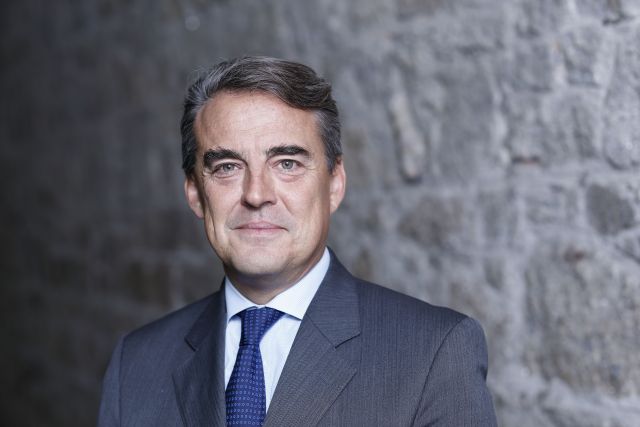Alexandre de Juniac on how sustainable aviation fuel is key for the industry’s energy transition
Ahead of the Sustainable Innovation Forum 2019 taking place in Madrid, Spain on the 10-11th December, we caught up with Alexandre de Juniac, Director General and Chief Executive Officer at IATA, to discuss how sustainable aviation fuel will be key for the industry's energy transition.

Ahead of the Sustainable Innovation Forum 2019 taking place in Madrid, Spain on the 10-11th December, we caught up with Alexandre de Juniac, Director General and Chief Executive Officer at IATA, to discuss how sustainable aviation fuel will be key for the industry's energy transition.
Q. It’s 2050 and zero-carbon targets have been met globally, what does the aviation industry look like? How would it be different from today?
Like all other sectors, aviation must work towards net-zero emissions. We have already halved the CO2 emissions a passenger contributes today compared with 1990. The challenge is that flying is accessible to more people. And as the world continues to develop, even more people will want to enjoy the freedom that aviation provides to explore, do business and make connections globally.
Massive reductions in aviation’s carbon footprint will be driven by technology. This includes technology to improve aircraft performance, including the progressive introduction of small electric aircraft for short-haul travel. And the game changer will be driven by technology that enables the production of sustainable aviation fuels at scale. The passenger will likely not notice much difference. But these are big changes that will keep our planet connected sustainably.
Q. Please can you tell us about the airline industry’s offsetting scheme, CORSIA. What is the value of such a scheme in aiding the decarbonisation of the industry? What are the keys to its success?
CORSIA is an enormous achievement for the aviation industry, multilateralism and the UN’s ICAO. From the end of next year, the aim is to cap growth in the emissions from international aviation. And, in doing so, aviation will generate some $40 billion in climate financing by 2035.
Aviation is a global business, where companies compete on a global level. This necessitates global solutions and CORSIA is a response to that. CORSIA is meant to avoid a patchwork of national or regional measures—measures such as politically motivated taxes which distort markets and are less efficient than offsetting at actually reducing carbon. And, CORSIA also helps boost ambition for climate action in areas where it has not been seen as such a high priority.
We are encouraged to see over 80 countries agree to take part in the first phases which are voluntary, however we would like to see even more join this world-first programme to help increase the coverage of CORSIA.
Q. Sustainable aviation fuels will be crucial for the industry’s energy transition. In your opinion, how close is the industry at realising these fuels full potential? What are the opportunities, barriers, and challenges to getting there?
Sustainable aviation fuel is just one part of our multi-pronged climate strategy, but is probably one of the most important.
We have come a long way since the first test flight of alternative fuels on a commercial aircraft ten years ago. It has been thoroughly tested for safety and certified and is now in continual use at five airports worldwide. Over 215,000 commercial flights have been operated on a blend of sustainable aviation fuel so far.
We know it works, is truly sustainable and we can likely completely transition to it (with around an 80% lifecycle CO2 reduction). The challenge remains the cost. To make sustainable aviation fuels a commercial reality we need policy support from governments and significant investment from the traditional energy sector.
What role does collaboration play in boosting air transport climate action? It’s a competitive industry, but do the different parts of the sector work together on climate action?
Aviation has a strong track record of working collaboratively on major issues of importance. That is why flying is so safe. Collaboration is critical because our daily operation relies on strong collaboration simply in order to get flights to their destinations.
The spirit of collaboration and global collaboration that makes aviation work has driven our approach to climate action. By working together through the Air Transport Action Group, airlines, airports, air traffic management and the makers of aircraft are driving significant improvement in the efficiency of our operations.
Q. What is the importance of events such as the Sustainable Innovation Forum for businesses participating in the energy transition?
All parts of the business community are working on ways to decarbonise, and platforms such as the Sustainable Innovation Forum can help build links between different sectors where there may be cross-cutting issues. Aviation has fairly unique challenges, but as we look to a new way of thinking about energy supply – through renewable fuels and battery technology – we need to explore the experiences and expertise available in other sectors.
The International Air Transport Association (IATA) is a Gold Sponsor of the upcoming 10th annual Sustainable Innovation Forum taking place alongside COP25, 10-11 December in Madrid, Spain. To learn more about the agenda, the panels, the speakers and how to register, visit the event's official website here.






